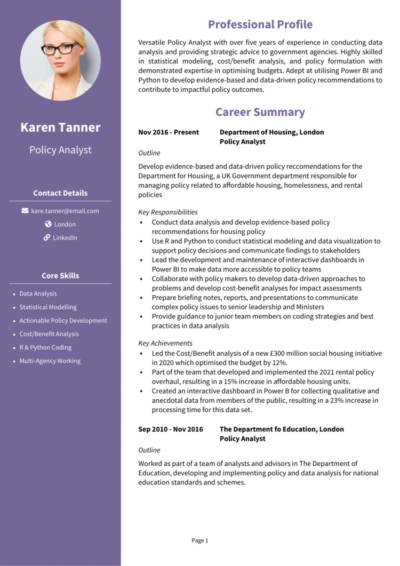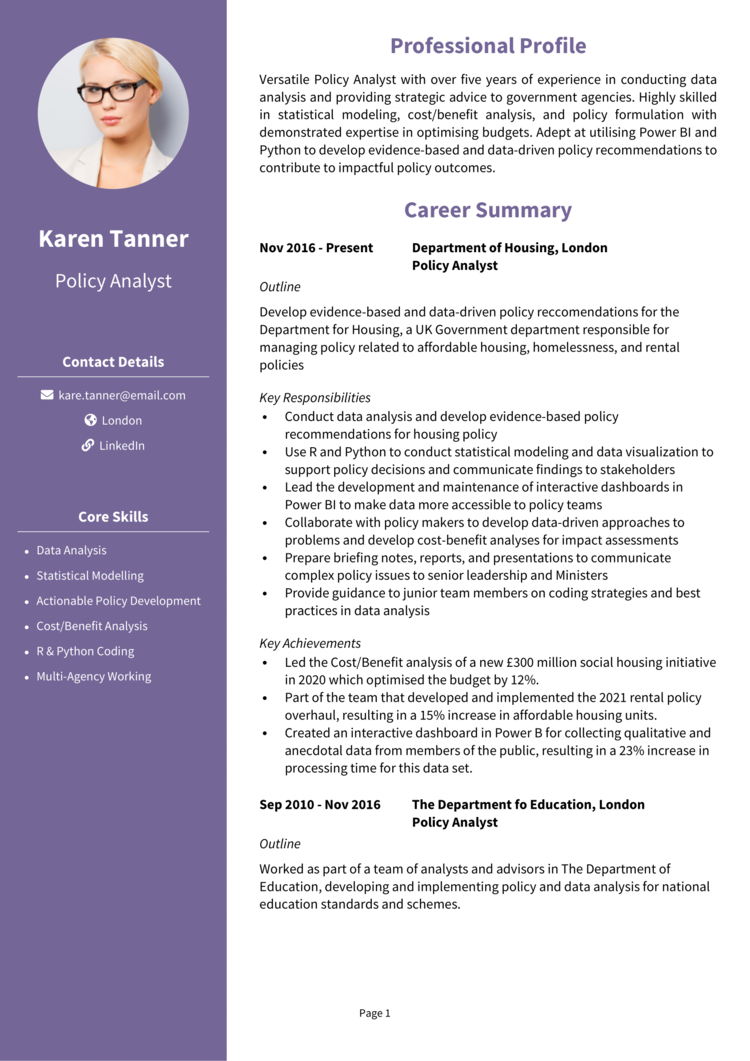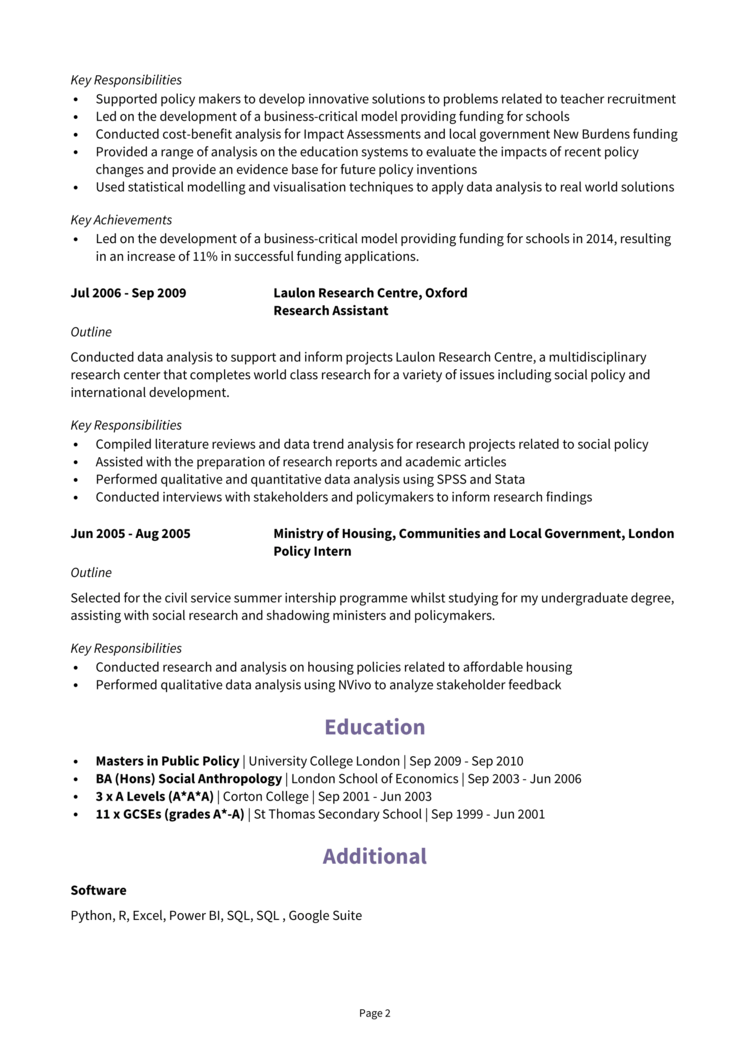You’ve got incredible analytical skills and you’re ready to put these to good use, but first, you need a CV that’s as carefully crafted as your policy reports.
To help you get this right, we’ve created a step-by-step guide that will teach you how to effectively showcase your skills and experience on any application.
This guide also includes a policy analyst CV example to inspire your own.
|
Policy Analyst CV example
Before you start writing your CV, take a look at the example Policy Analyst CV above to give yourself a good idea of the style and format that works best in today’s job market.
Also, take note of the type of content that is included to impress recruiters, and how the most relevant information is made prominent, to ensure it gets noticed.


Policy Analyst CV layout and format
Hiring managers and recruiters are frequently overloaded with applications, and if they can’t identify the relevant information in your CV within a few seconds, your application may be overlooked.
To avoid this, it’s essential to format and structure your CV in a manner that makes it simple to pick out the most important information, even if the reader is in a rush.
Tips for formatting your Policy Analyst CV
- Length: While there’s no ‘official’ CV length rule, the majority of recruiters agree that less is more. Aim for two pages of A4 or less. This is just enough room to showcase your suitability to the role, without overwhelming recruiters with irrelevant or excessive content.
- Readability: By clearly formatting your section headings (bold, or a different colour font, do the trick) and breaking up big chunks of text into snappy bullet points, time-strapped recruiters will be able to skim through your CV with ease.
- Design: Your CV needs to look professional, sleek and easy to read. A subtle colour palette, clear font and simple design are generally best for this, as fancy designs are often harder to navigate.
- Photos: Recruiters can’t factor in appearance, gender or race into the recruitment process, so a profile photo is not usually needed. However, creative employers do like to see them, so you can choose to include one if you think it will add value to your CV .
Quick tip: Creating a professional CV style can be difficult and time-consuming when using Microsoft Word or Google Docs. To create a winning CV quickly, try our quick-and-easy CV Builder and use one of their eye-catching professional CV templates.
CV structure
As you write your CV, divide and sub-head into the following sections:
- Name and contact details – Always start with these, so employers know exactly how to get in touch with you.
- CV profile – Add a short summary of your relevant experience, skills and achievements, which highlights your suitability.
- Core skills section – A 2-3 columned list of your key skills.
- Work experience – A detailed list of any relevant work experience, whether paid or voluntary.
- Education – An overview of your academic background and any training you may have completed.
- Hobbies and interests – A brief overview of your hobbies and interests, if they’re relevant (optional).
Now you understand the basic layout of a CV, here’s what you should include in each section of yours.
Contact Details
Kick-start your CV with your contact details, so recruiters can get in touch easily.
Here’s what you should include:
- Mobile number
- Email address – Make sure it’s professional, with no silly nicknames.
- Location – Your town or city is sufficient, rather than a full address.
- LinkedIn profile or portfolio URL – Ensure they’ve been updated and are looking slick and professional.
Quick tip: Avoid listing your date of birth, marital status or other irrelevant details – they’re unnecessary at this stage.
Policy Analyst CV Profile
Make a strong first impression with recruiters by starting your CV with an impactful profile (or personal statement for junior applicants).
This short introduction paragraph should summarise your skills, experience, and knowledge, highlighting your suitability for the job.
It should be compelling enough to encourage recruiters to read through the rest of your CV.
CV profile writing tips:
- Make it short and sharp: When it comes to CV profile length, less is more, as recruiters are often time-strapped. Aim for around of 3-5 persuasive lines.
- Tailor it: The biggest CV mistake? A generic, mass-produced document which is sent out to tens of employers. If you want to land an interview, you need to tailor your CV profile (and your application as a whole) to the specific roles you’re applying for. So, before you start writing, remember to read over those job descriptions and make a list of the skills, knowledge and experience the employers are looking for.
- Don’t add an objective: You only have a small space for your CV profile, so avoid writing down your career goals or objectives. If you think these will help your application, incorporate them into your cover letter instead.
- Avoid generic phrases: Focus on fact, not fluff. Phrases like “Committed and enthusiastic thought-leader” and “Dynamic problem solver” might sound fancy, but they’ll do nothing for your application. Not only do they sound cheesy, but they have no substance – stick to real skills and facts
Example CV profile for Policy Analyst
What to include in your Policy Analyst CV profile?
- Experience overview: To give employers an idea of your capabilities, show them your track record by giving an overview of the types of companies you have worked for in the past and the roles you have carried out for previous employers – but keep it high level and save the details for your experience section.
- Targeted skills: Ensure that your profile highlights your key skills that are most relevant to your Policy Analyst, and tailor them to match the specific job you are applying for. To do this, refer to the job description to closely align your skills with their requirements.
- Key qualifications: If you have any qualifications which are highly relevant to Policy Analyst jobs, then highlight them in your profile so that employers do not miss them.
Quick tip: If you are finding it difficult to write an attention-grabbing CV profile, choose from hundreds of pre-written profiles across all industries, and add one to your CV with one click in our quick-and-easy CV Builder. All profiles are written by recruitment experts and easily tailored to suit your unique skillset.
Core skills section
Create a core skills section underneath your profile to spotlight your most in-demand skills and grab the attention of readers.
This section should feature 2-3 columns of bullet points that emphasise your applicable skills for your target jobs. Before constructing this section, review the job description and compile a list of any specific skills, specialisms, or knowledge required.
Important skills for your Policy Analyst CV
Research and Analysis – Conducting research, collecting, and analysing data and information to support policy development, and making recommendations based on findings.
Policy Communication – Producing high-quality written reports, briefings, and presentations for a range of audiences, communicating complex information clearly and succinctly.
Policy Development – Developing and implementing policies, identifying areas for improvement, and developing solutions to address policy gaps.
Project Management – Developing and managing projects, including setting project timelines, budgets, and deliverables.
Data Management – Collecting, organizing, and analysing data to inform policy decisions and create reports.
Stakeholder Engagement – Building relationships with stakeholders to understand their needs and concerns and seeking their input and feedback on policy issues.
Legal and Regulatory Knowledge – Understanding legal and regulatory frameworks and their impact on policy development, as well as ensuring compliance with relevant legislation.
Problem Resolution – Identifying problems and developing creative solutions to complex policy issues.
Strategic Planning – Developing long-term strategies that align with organisational objectives and meet stakeholder needs.
Stakeholder Management – Building and maintaining positive relationships with colleagues, stakeholders, and partners, and collaborating effectively in a team environment.
Quick tip: Our quick-and-easy CV Builder has thousands of in-demand skills for all industries and professions, that can be added to your CV in seconds – This will save you time and ensure you get noticed by recruiters.


Work experience section
By this point, employers will be keen to know more detail about you career history.
Starting with your most recent role and working backwards, create a snappy list of any relevant roles you’ve held.
This could be freelance, voluntary, part-time or temporary jobs too. Anything that’s relevant to your target role is well-worth listing!
Structuring each job
Recruiters will be keen to gain a better idea of where you’ve worked and how you apply your skill-set in the workplace.
However, if they’re faced with huge, hard-to-read paragraphs, they may just gloss over it and move onto the next application.
To avoid this, use the simple 3-step role structure, as shown below:
Outline
Start with a 1-2 sentence summary of your role as a whole, detailing what the goal of your position was, who you reported to or managed, and the type of organisation you worked for.
Key responsibilities
Follow with a snappy list of bullet points, detailing your daily duties and responsibilities.
Tailor it to the role you’re applying for by mentioning how you put the target employer’s desired hard skills and knowledge to use in this role.
Key achievements
Finish off by showcasing 1-3 key achievements made within the role.
This could be anything that had a positive effect on your company, clients or customers, such as saving time or money, receiving exemplary feedback or receiving an award.
Sample job description for Policy Analyst CV
Outline
Develop evidence-based and data-driven policy recommendations for the Department for Housing, a UK Government department responsible for managing policy related to affordable housing, homelessness, and rental policies.
Key Responsibilities
- Conduct data analysis and develop evidence-based policy recommendations for housing policy
- Use R and Python to conduct statistical modelling and data visualisation to support policy decisions and communicate findings to stakeholders
- Lead the development and maintenance of interactive dashboards in Power BI to make data more accessible to policy teams
- Collaborate with policy makers to develop data-driven approaches to problems and develop cost-benefit analyses for impact assessments
Quick tip: Create impressive job descriptions easily in our quick-and-easy CV Builder by adding pre-written job phrases for every industry and career stage.
Education and qualifications
Although there should be mentions of your highest and most relevant qualifications earlier on in your CV, save your exhaustive list of qualifications for the bottom.
If you’re an experienced candidate, simply include the qualifications that are highly relevant to Policy Analyst roles.
However, less experienced candidates can provide a more thorough list of qualifications, including A-Levels and GCSEs.
You can also dedicate more space to your degree, discussing relevant exams, assignments and modules in more detail, if your target employers consider them to be important.
Hobbies and interests
This section is entirely optional, so you’ll have to use your own judgement to figure out if it’s worth including.
If your hobbies and interests could make you appear more suitable for your dream job, then they are definitely worth adding.
Interests which are related to the industry, or hobbies like sports teams or volunteering, which display valuable transferable skills might be worth including.


Creating a strong Policy Analyst CV requires a blend of punchy content, considered structure and format, and heavy tailoring.
By creating a punchy profile and core skills list, you’ll be able to hook recruiter’s attention and ensure your CV gets read.
Remember that research and relevance is the key to a good CV, so research your target roles before you start writing and pack your CV with relevant skills.
Best of luck with your next application!











